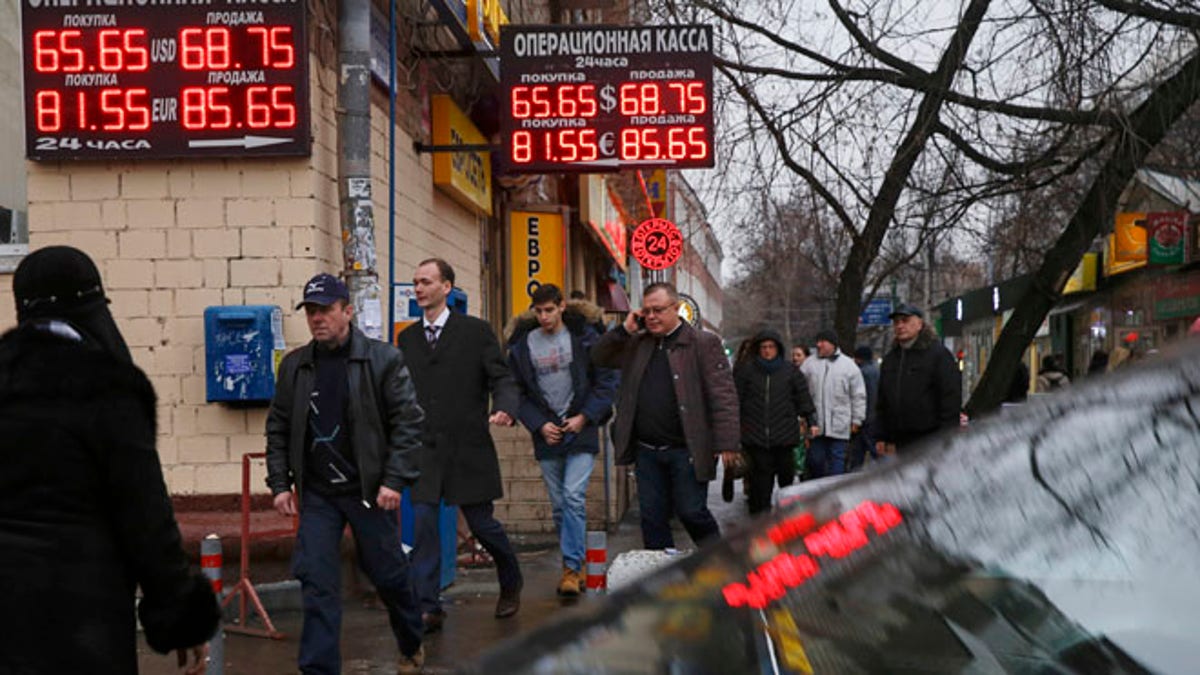
Dec. 16, 2014: Signs advertising currencies are illuminated next to the exchange office in Moscow, Russia. (AP)
President Obama plans to sign new congressional legislation that heaps more sanctions on Russia -- another blow to a country whose economy and global dominance already is struggling from earlier sanctions and falling oil prices.
White House spokesman Josh Earnest said Tuesday that Obama has misgivings about the legislation passed overwhelmingly last week in Congress, but still thinks it gives him the needed flexibility.
"The bite on the Russian economy is only becoming stronger," Earnest said.
The decision, coupled with economic developments in Russia, raise questions over whether Moscow is becoming more vulnerable.
Earnest's remarks came just hours after Russia’s central bank made a desperate attempt to prop up the country’s currency, the ruble, which has plummeted in value as the result of the lower oil prices in recent weeks and roughly eight months of Western sanctions imposed over Russia's involvement in Ukraine.
The ruble's collapse is expected to increase pressure on Russian President Vladimir Putin to end his foray into neighboring Ukraine.
Still, Putin maintains strong, widespread support among his people. So the new sanctions might not be the blow that forces him to pull back in Ukraine, Heritage Foundation scholar Luke Coffey said.
“We’re not at that point yet,” Coffey, the Margaret Thatcher fellow at the conservative think tank, said Tuesday. “We still have a long way to go before the population turns on Putin.”
Coffey argues in part that the sanctions largely target the Russian elite, so they will take some time to trickle down to the general population, and that a complete collapse of Russia is not in the West’s best interest.
“Who knows what sort of chaos will happen in that part of the world,” he told FoxNews.com. “The West has spent 30 years trying to integrate Russia into the global economy.”
In the aftermath of Ukraine residents ousting their pro-Moscow president in February and replacing him with more Western-friendly President Petro Poroshenko, the Russian Federation has annexed Ukraine’s Crimea Peninsula and backed armed, pro-Russian separatists elsewhere in the county’s eastern region.
The violent and often deadly clashes with pro-Ukraine government forces have resulted in the worst standoff between Russia and the West since the Cold War.
On Tuesday, Secretary of State John Kerry also said Putin has tried in recent days to ease tensions in eastern Ukraine and that Western nations are poised to ease existing sanctions.
Speaking in London, Kerry said the U.S.-European sanctions are intended to show Russia the price of its actions in Ukraine but argued the collapse of the ruble is the result “a lot of combined factors."
Still, Kerry, who met Monday with Russia's foreign minister in Rome, said the sanctions are designed to lead Putin into making different choices.
“These sanctions could be lifted in a matter of weeks or days, depending on the choices that President Putin takes,” said Kerry, who did not address the new congressional legislation.
Earnest said the White House has concerns about the legislation in part because it sends a confusing message to allies, considering some of the language “does not reflect the consultations that are ongoing."
Russia on Tuesday raised the ruble’s interest rate from 10.5 percent to 17 percent.
The falling price of oil hurts Russian economy because the country's precious natural gas supply is traded on the global market in the more valuable U.S. dollar. And Russia’s budget is based on oil selling for $100 a barrel, double the cost right now.
Republicans and Democrats, including House Speaker John Boehner, R-Ohio, have called on Obama to sign the sanction legislation immediately.
The bill would require the president to impose penalties on state-owned arms dealer Rosoboronexport and other Russian defense companies tied to unrest in Ukraine, Moldova, Georgia and Syria. The sanctions would be extended to individuals and entities that help the companies.
The bill also will give the president the authority to provide lethal and nonlethal military assistance to Ukraine. This includes anti-tank weapons, counter-artillery radar and tactical surveillance drones. The bill authorizes $350 million over two years to cover the cost.
"The territorial integrity of Ukraine must be restored and President Putin must understand that his destabilizing actions have serious and profound consequences for his country,” said Sen. Bob Menendez, D-N.J., chairman of the Foreign Relations Committee.
FoxNews.com's Joseph Weber and The Associated Press contributed to this report.












































